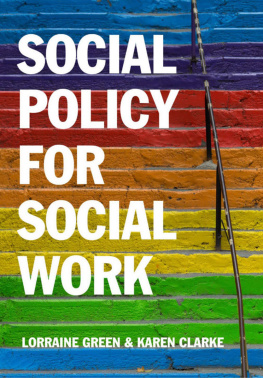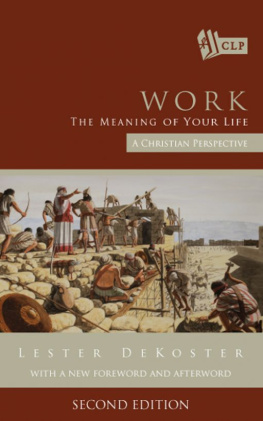SAGE Publications Ltd
1 Olivers Yard
55 City Road
London EC1Y 1SP
SAGE Publications Inc.
2455 Teller Road
Thousand Oaks, California 91320
SAGE Publications India Pvt Ltd
B 1/I 1 Mohan Cooperative Industrial Area
Mathura Road
New Delhi 110 044
SAGE Publications Asia-Pacific Pte Ltd
3 Church Street
#10-04 Samsung Hub
Singapore 049483
Lester Parrott with Noreen Maguinness 2017
First published 2017
Apart from any fair dealing for the purposes of research or private study, or criticism or review, as permitted under the Copyright, Designs and Patents Act, 1988, this publication may be reproduced, stored or transmitted in any form, or by any means, only with the prior permission in writing of the publishers, or in the case of reprographic reproduction, in accordance with the terms of licences issued by the Copyright Licensing Agency. Enquiries concerning reproduction outside those terms should be sent to the publishers.
Library of Congress Control Number: 2017933568
British Library Cataloguing in Publication data
A catalogue record for this book is available from the British Library
ISBN 978-1-4739-6912-4
ISBN 978-1-4739-6913-1 (pbk)
Editor: Kate Keers
Editorial assistant: Talulah Hall
Production editor: Katie Forsythe
Copyeditor: Rosemary Morlin
Indexer: Cathryn Pritchard
Marketing manager: Tamara Navaratnam
Cover design: Wendy Scott
Typeset by: C&M Digitals (P) Ltd, Chennai, India
Printed in the UK
About the Authors
Lester Parrottis a Lecturer in Social Work at Keele University who will have retired when this book is published. He has taught social work and social policy at a number of universities across the UK. He is the author of
Social Work and Poverty (2014) and is also the author of
Values and Ethics in Social Work Practice, which is now in its third edition and is about to be completely revised for publication in 2018. His current research interests include the impact of social policy upon the lives of service users and social workers with particular reference to the consequences of austerity upon the development of and access to social care services and the restructuring of social work both organisationally and as a profession.Noreen Maguinnessis a Lecturer in Social Work at Edge Hill University. She qualified as as social worker in 1987 and then went on to practice in children and family social work for nearly 20 years a successful career in social work; working in the area of children and family social work. Prior to moving into social work education in 2004 Noreen was a Child Protection Multi-Agency Trainer. She is currently completing a Doctorate in Social Work.
Acknowledgements
I would like to acknowledge those authors who willingly gave their permission to include material in this book. The administration staff at Keele University have provided invaluable support by allowing me the space for to teach and write. I would also like to thank my colleagues, past and present, for their patience and support and all of those students who have contributed to my understanding of social work since starting to teach social work in 1996 at Glyndwr University and at Keele University from 2007.
Chapter 1 Theory, Ideology and Discourse in Social Work
Whenever I pick up a newspaper and read about what is happening in the world and read about a particular event or story the question which comes into my head is Why is this so? As soon as this thought comes to the front of my consciousness I would argue I am beginning to theorise. I am trying to understand why a particular event has happened, what might have caused this to happen and how might I make sense of it. When I talk to students about their experiences on their practice placements it is not uncommon for them to relate conversations they have had with some social workers who tell them to forget all that theory they have learnt at university now that they are in the real world. Of course that in itself is a theoretical statement albeit in an attenuated form about the nature of the real world as those social workers perceive it to be. It is not possible to go through life without trying to make sense of the social world that we live in. We need to do this in order to be able to function on a daily basis through understanding the challenges that a constantly changing world presents to us and our fellow human beings.
Social workers who hold to this idea of theoryless practice nonetheless have to construct some kind of conceptual framework whereby they can make sense of the world they inhabit in order to practise social work. The theories that they hold may not be explicit and they may not be formally thought through but they are theories nonetheless albeit constructed on an informal basis. Such informal theory develops from practical experience on a day-to-day basis. Informal theory is an important source of knowledge in social work but it is theory. The problem with social workers telling students to forget theory is that they do not make explicit the use of their own theories. More importantly they do not recognise the importance of making their thinking explicit so that their ideas can be open to challenge and therefore open to be investigated for their coherence and clarity. In so doing we are opening up our ideas about the world to critical scrutiny so that alternative explanations can be explored to see if we can construct more coherent explanations that will help us practise in a more effective manner.
It is not enough for student social workers to be assailed by demands to forget theory from their colleagues but depressingly for me successive government ministers and their functionaries (see Nairey 2014) have also criticised social work education for its apparent commitment to teaching too much theory. As long ago as the 1980s, the criticism by the head of the Central Council for Education and Training in Social Work (CCETSW) Jeffrey Greenwood was that social work education was focused excessively upon teaching anti-racism and anti-oppressive practice (AOP), by the time New Labour assumed power Health Minister Jacqui Smith (2002) was showing her concern:
Social work, like teaching, is a practical job. It is about protecting people and changing lives, not about being able to give a fluent and theoretical explanation of why they got into difficulties in the first place.
More recently former Minister of Education Michael Gove (2013) had this to say about social work training:
Theories of society predominate over an effective understanding of child development, the cognitive damage that accrues through neglect and appropriate thresholds for taking children into care.

















